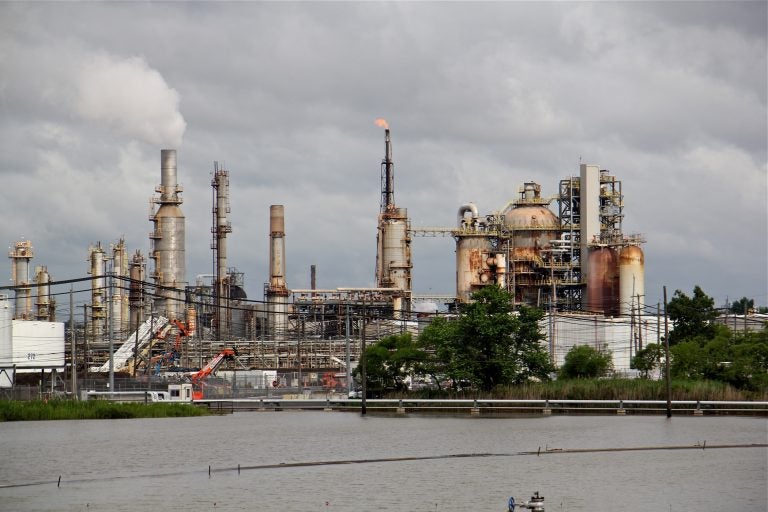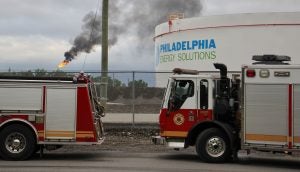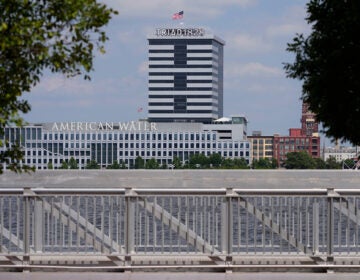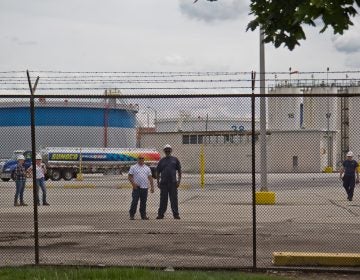Fire-damaged South Philadelphia refinery files for bankruptcy again
Damage pushes the refinery to file for Chapter 11 again. Philadelphia Energy Solutions expects to restructure with a $100 million financial agreement.

Philadelphia Energy Solutions refinery in South Philadelphia. (Emma Lee/WHYY)
Updated 6:45 p.m.
Philadelphia Energy Solutions has filed for bankruptcy protection for the second time in two years and entered into a financing agreement for up to to $100 million with its current debtholders.
The financially troubled company announced it would shut its operations after a devastating fire and series of explosions last month at its South Philadelphia refinery. PES expected to stop processing crude oil this week.
The June 21 incident damaged the refinery’s alkylation unit and cut revenues sharply, which forced PES to submit a Chapter 11 bankruptcy petition, the company announced Sunday. PES said it expects to complete restructuring through the court process, according to a statement.
“Today’s agreement provides PES Energy with the additional financing and liquidity necessary to ensure we can safely wind down our refining operations and, with the support of our insurers and stakeholders, best position the company for a successful reorganization, the rebuilding of our damaged infrastructure, and a restart of our refining operations,” Mark Smith, chief executive officer of PES Energy, said in a press release.
The company will continue cooperating with federal, state and city agencies investigating the fire, and it has committed to extending pay for the majority of its 1,000 workers through Aug. 25. PES’s goal is to rebuild the damaged infrastructure and resume refining operations with the proposed debtor-in-possession financing provided by the Chapter 11 plan.
“The company expects to establish an orderly process for the evaluation of a range of potentially value-maximizing transactions in the weeks ahead and to work expediently with its insurers, stakeholders, and third parties,” PES said.
The first hearing on the PES petition is scheduled for 2:30 p.m. Tuesday before U.S. Bankruptcy Court Judge Kevin Gross in Wilmington.
According to the petition, the fire at the Girard Point facility destroyed 57 percent of the refinery capacity, leaving it inoperable and in need of a “lengthy and extensive rebuild.”
“The Girard Point Incident has left the Debtors in a crippled state, and since the Girard Point Incident, the Refining Complex has entered an extreme preservation-focused operational mode of conduct, processing only approximately 145,000 barrels of crude oil per day, that the Debtors believe will ultimately lead to the preservation of value for all stakeholders, coupled with compliance with all applicable health, safety, and environmental obligations,” the document says.
In the interim, according to PES filing, the company is “running only limited amounts of crude oil through the facility and idling damages portions of the Refining Complex by securing its equipment, removing elevated risk chemicals, and putting catalyst, equipment, and vessels in a safe state.”
Christina Simeone, senior fellow at the University of Pennsylvania’s Kleinman Center for Energy Policy, who has authored multiple reports on the refinery, said the bankruptcy’s main intent is to allow the company to maintain a semblance of financial viability.
“The focus at the moment seems to be maintaining relationships with the critical business partners and vendors in the supply chain with whom, if they can’t keep positive relationships, they won’t be able to preserve the options of rebuilding and restarting,” Simeone said.
Joseph Otis Minott, executive director of the Clean Air Council in Philadelphia, said,
“I’m not a bankruptcy lawyer, I’m an environmental lawyer, but it seems absurd that within two years this company is going through another bankruptcy.”
The city’s largest air polluter should shut down, Minott said.
Even before the fire, the 1,300-acre site had been in the process of major environmental cleanup. Different companies have operated refineries there since 1866, with very little regulation until the 1970s. Both the soil and the groundwater are heavily contaminated. The plant was Philadelphia’s single-largest source of particulate pollution.
“To me,” Minott said, “the writing is on the wall: This is not an economically sustainable refinery, it needs to be closed down, it needs to be cleaned up, and the workers need to get government funding to transition to different jobs.”
Ryan O’Callaghan, head of United Steelworkers Local 10-1, which represents several hundred workers at the refinery, said they’re hoping PES can get rebuild it and restart.
“We’re just hoping that it does come up and running and that the jobs will remain as they are, and that the domestic steel supply would be maintained and we won’t have to import it from Europe,” O’Callaghan said.
In 2012, Delaware’s Carlyle Group entered a joint venture with Sunoco to form Philadelphia Energy Solutions and rescue the 335,000-barrel-per-day refinery complex with the help of federal and state grants. PES filed for bankruptcy in January 2018, citing the rising cost of a program that forces refiners that don’t blend ethanol to buy renewable fuel standard credits on the open market.
In February of this year, Reuters reported the company was in financial trouble again, just six months after exiting that bankruptcy. After the fire, analysts told StateImpact Pennsylania that finding a willing buyer for the refinery was unlikely.
Through insurance claims, PES could recoup losses caused by the fire up to $1.25 billion, Debtwire reported. The potential payouts include $1 billion for property damage and $250 million for loss of business, according to Reuters.
Reshmi Basu, editor of restructuring at Debtwire, said the company can either sell its assets, liquidate, or reorganize around the performing parts of it. Judging by the bankruptcy filing, Basu said, it’s trying to keep different options open.
Tuesday’s first hearing in U.S. Bankruptcy Court will be key, Basu said. “The counsel for the company will lay out how we got to this filing and what are the next steps for the company.”
WHYY is your source for fact-based, in-depth journalism and information. As a nonprofit organization, we rely on financial support from readers like you. Please give today.






